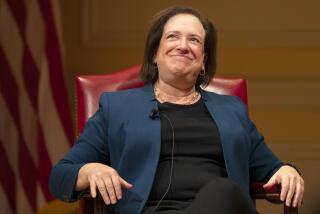Court Questions Congress’ Power on Tax Issue : Law: California case centers on the application of changes retroactively. Justices appear to dispute the idea that lawmakers have the authority.
- Share via
WASHINGTON — The Supreme Court, hearing a case brought by a California tax lawyer, reacted skeptically Monday to arguments that Congress has broad authority to apply tax changes retroactively.
In their questions, eight of the nine justices appeared to dispute the notion that Congress can change tax laws so as to repeal deductions after taxpayers have acted to take advantage of them.
“The possibilities for the government are wonderful!” exclaimed Justice Antonin Scalia. “You dangled this (deduction) in front of a taxpayer and then took it away” after he jumped at the bait, he said.
The issue of retroactive tax changes arose in the case of a Newport Beach tax lawyer who lost $630,000 for a client when Congress in 1987 repealed a deduction it had created in 1986. The tax lawyer had taken advantage of the deduction in December, 1986.
Although the facts in this case are unusual, Republican senators have urged the justices to use it as a vehicle for sharply limiting the power of Congress to impose tax changes retroactively.
During Monday’s argument, the justices gave no hint whether they would issue a narrow ruling limited mainly to the circumstances in the Newport Beach case or would rule broadly enough to affect the 1993 tax law, which Congress approved last August and applied retroactively to the beginning of the year.
They did suggest, however, that taxpayers are entitled to some protection under the Constitution’s guarantee of “due process of law.”
Assistant Solicitor General Kent L. Jones, representing the Justice Department, noted that the court for more than 60 years has given Congress virtually unlimited authority to impose tax changes retroactively.
“A taxpayer should be prepared for retroactive changes,” Jones said.
But the taxpayer in this case, an executor of an estate, took “a perfectly sensible approach,” commented Justice Sandra Day O’Connor, and then was penalized when Congress decided the next year to repeal a deduction that was deemed overly generous.
Yes, Jones agreed, but the tax deduction as written in the 1986 law “was too good to be true.”
“Is someone supposed to read the law and say, ‘Well, Congress couldn’t have meant that’?” asked a scowling Chief Justice William H. Rehnquist.
Two justices posed this possibility: Suppose Congress repeals the capital gains tax during one year and millions of Americans take advantage of that opportunity to sell their stocks. If too much revenue is lost, could Congress re-enact the tax and retroactively impose it for the earlier year?
Yes, Jones said, as long as Congress saw it as a rational way to close a loophole or raise revenue.
“I can’t think of any example that would violate your rule,” Justice David H. Souter interrupted.
“So we should just trust Congress to be rational?” wondered Justice Ruth Bader Ginsburg.
Russell Allen, a Newport Beach attorney representing the taxpayer, urged the court to declare unconstitutional any retroactive tax changes that punish a person who takes advantage of their provisions.
“The taxpayer here does not contend all retroactive tax legislation is unconstitutional,” Allen said, but there are “serious problems of unfairness” if tax deductions are repealed after the fact, he added.
The court will issue a ruling in the case, U.S. vs. Carlton, 92-1941, in several months.
The high court also announced Monday that it would clarify a child pornography law.
The case arose when a Van Nuys distributor of X-rated videos was caught selling tapes involving actress Traci Lords after it was learned that she was a minor when the films were made.
Lawyers for both the government and the video distributor agree that it would be unfair and unconstitutional to prosecute someone for distributing child pornography if he did not know the actress was under 18.
The distributor, Rubin Gottesman, knew Lords was under age in the tapes he sold. Nonetheless, the U.S. 9th Circuit Court of Appeals invalidated his conviction because it concluded the law was not clear.
More to Read
Get the L.A. Times Politics newsletter
Deeply reported insights into legislation, politics and policy from Sacramento, Washington and beyond. In your inbox twice per week.
You may occasionally receive promotional content from the Los Angeles Times.











